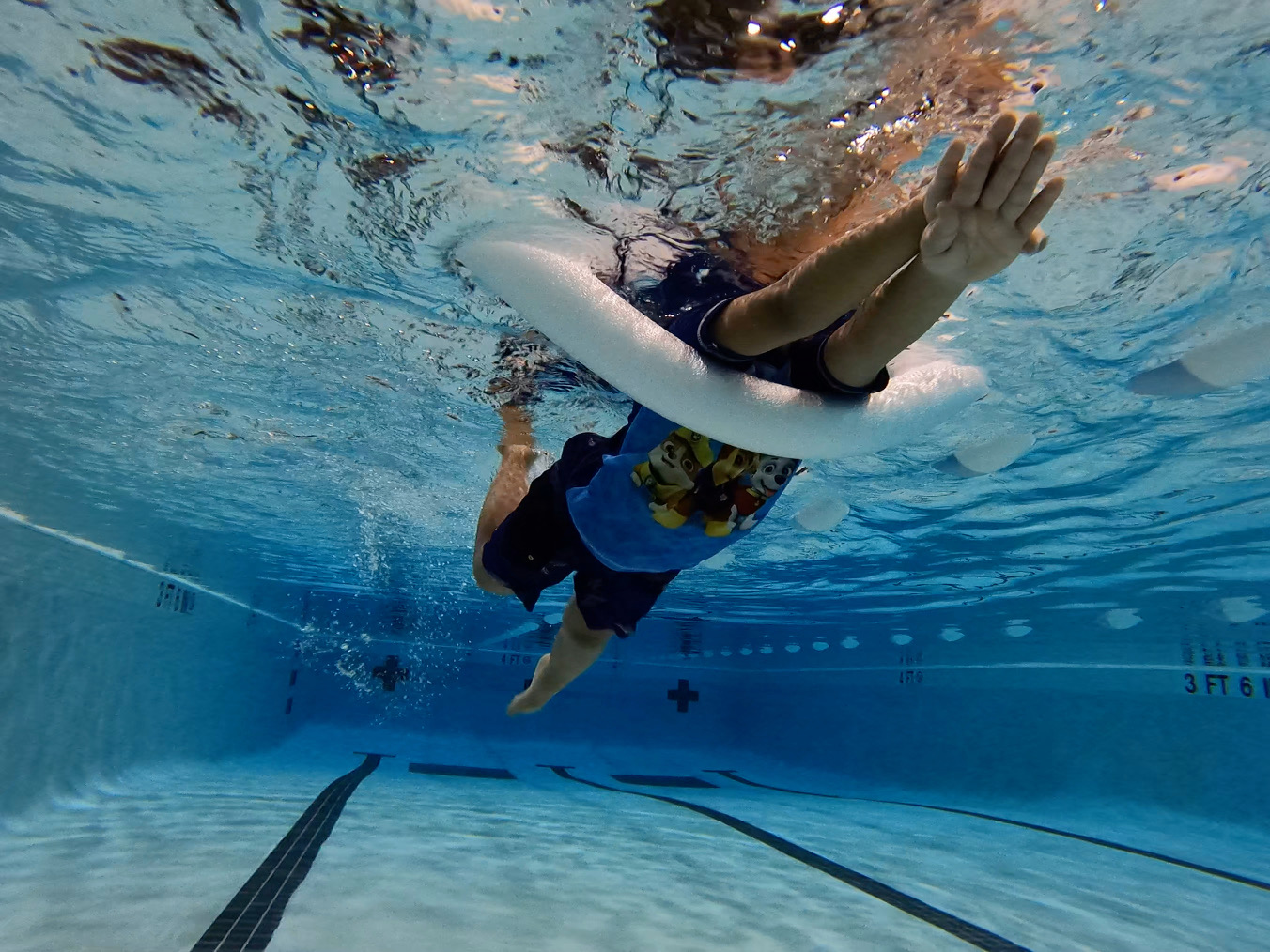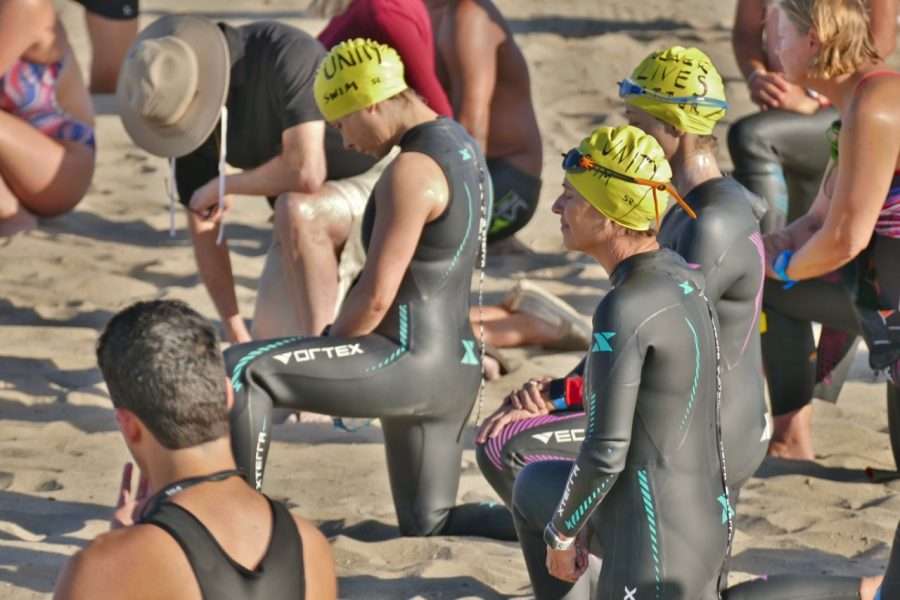The Underlying Impact of Racism in Swimming
June 24, 2021, started as a regular day for Kamilah Cunningham when she accompanied her daughter and niece to the community pool in South Euclid, Ohio, a suburb of Cleveland.
An afternoon enjoying the water and sunny views turned into something unexpected when her daughter and niece discovered a disturbing poster on the lower right-hand corner of a bulletin board.
Pictured on the poster were arrows indicating what actions are “cool” and “not cool” to partake in at the pool. The American Red Cross poster titled “Be Cool, Follow The Rules” intended to explain the importance of pool safety. But what caught them off guard were the “not cool” arrows directed at the Black and brown children, while the “cool” arrows were targeted at the white children.
Kamilah didn’t notice the picture on the cluttered board. Once her daughter and niece showed it to her, they expressed their concerns about the poster, pointing out their grievances on the depiction of the Black swimmers.
“I’ve never seen it [and] that wasn’t our first time at the pool this summer, but I had never really paid that much attention to it,” Cunningham said. “So what I did was have [the kids] point out to me what they saw rather than [it] being an adult interpretation of what I thought.”
Trusting their judgment, Cunningham posted the image to her Facebook account to hear other individuals’ thoughts on the matter. She stated the comments were generally supportive of her stance.
“My Facebook friends are pretty diverse in their backgrounds and families. And so many people were just saddened by it,” Cunningham said. “And it’s [the responses were] kind of like I’m so sorry the kids had that experience.”
Red Cross received criticism for this same poster in 2016 for being insensitive to Black swimmers. Black Kids Swim released an official statement on the controversy soon after the incident stating, “The images and videos produced and distributed by the Red Cross are unfortunate in that they discourage Black children from participating in the sport of swimming by extending negative stereotypes.”
Following the backlash, the Red Cross quickly removed the poster from their website and swim app and ceased production for more to be made. Unfortunately, this issue is still unresolved and has reignited further discussion on implicit bias in swimming years later.
Racial Discrimination in Swimming is Nothing New
Situations such as this personally resonate with Cunningham because she works in the social services field. Working at a behavioral health agency in the Cleveland area, her work centers on the concept of decolonization.
“It’s [decolonization] looking at what are the systemic things that impact us and not just looking at the short-term fix,” Cunningham said.
Community is the essential part of this process to produce any tangible solutions. Through her work in initiatives like The Blacker the Brain cohort, she’s collaborated with people from different professions and industries to prepare methods for improving conditions for people on the ground.
But on the opposite end, the current guardrails in place have made it difficult for many marginalized groups, especially Black Americans, to move up that ladder. And its very existence in the swimming world.
Access to swimming in safe, quality pools has been historically out of reach for Black Americans. A result of Jim Crow policies, the closing of community pools in urban areas, and an increase in privatized swimming clubs in the suburbs.
Though racial discrimination is illegal, the byproducts of that former era still manifest in the way people view Black Americans, whether in appearance, skill, or personality. The recent controversy of the Olympics banning the use of the Soul Cap is a prime example of this very issue.
Navigating through the swimming space has been challenging at times for Cunningham’s daughter, Breiana. She has to take special precautions pertaining to her sickle cell disease, such as testing to see if pools are at a specific temperature to ensure it’s comfortable for her to swim in.
Additionally, she’s experienced traumatic instances where fellow swimmers distanced themselves from her daughter. She’s seen parents guiding their children to different parts of the pool to avoid swimming near her daughter. These small but memorable events left a significant impact on Breiana.
“They’re Black kids, so they know what that feels like,” Cunningham said. As a parent, she believes it’s always best to listen to your children’s first instinct, and these incidents prove that it’s essential.
Going through this experience with her daughter has led Cunningham to continue to fight for change in the swimming community. She is aware fundamental change only occurs when organizations and individuals put words to action.
Substantive Change Happens Through a Systemic Approach
One of the main reasons Cunningham is attracted to Black Kids Swim is that it provides motivation and a sense of community for young Black swimmers. She says having the ability to be themselves without negative, outside distractions or the fear of misplaced stigma is a comfortable feeling.
“I am a parent who can’t swim, but my kids can. And so I always thought it was important to let my kids experience those things that they want to experience even if they don’t fit the mold of what people may say that they should,” she said. “They deserve to still be able to do whatever their heart tells them, whatever brings them joy. They need to be strong and resilient, but they also need to feel joy.”
Cunningham encourages the Red Cross to implement these same tactics to create an inclusive and understanding environment for the needs of Black swimmers. For Cunningham, it all comes back to decolonizing the structures at play that continue to rehash this problem.
“We always want to see change, but we also have to get to a space of what change really looks like,” she explained. “How do I undo those there? And so, how do we help each other through that space?
Cunningham believes it’s not simply about the poster and its removal, but how these images, whether overtly or covertly, intentional or not, continue to spread false narratives of Black Americans and the harm it contributes to us existing in society.
She advocates for the Red Cross and similar organizations to include more input from Black voices and think carefully about their promoted messages.
Black Kids Swim fully supports this message and truly believes that Black representation creates an inclusive environment for all swimmers to thrive.
By addressing this issue, she hopes this leads to a place where more Black Americans continue to be appreciated, heard, and cared for in the swimming community.
BKS has and continues to hold organizations like the Red Cross accountable for actions that have a consequential impact on the view and treatment of Black Americans in competitive swimming and daily life. Racism in aquatic spaces cannot be allowed to continue.






